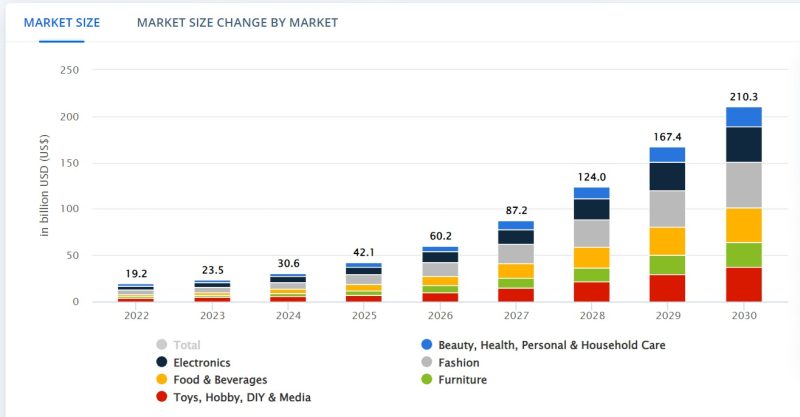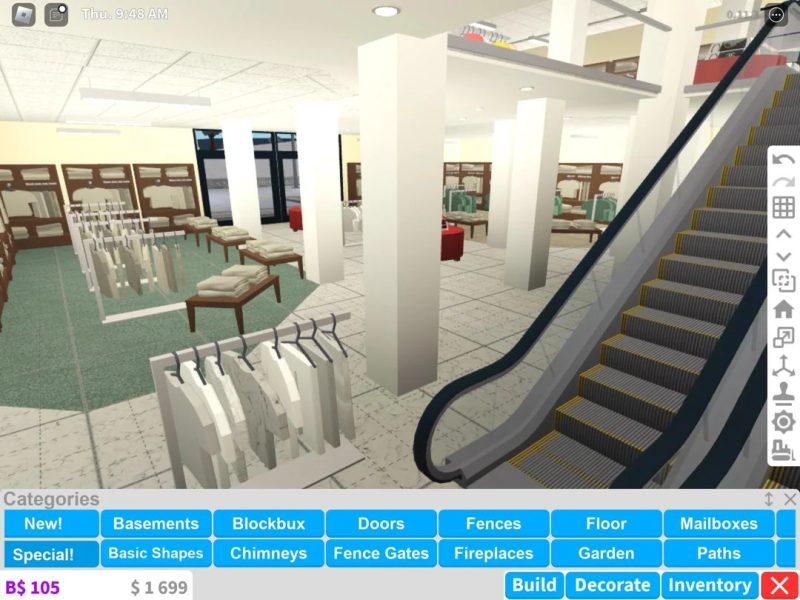Imagine putting on VR goggles and suddenly finding yourself in a shopping mall of the future. You are free to roam the aisles, try on clothes and test products without moving from your seat.
The e-commerce market is evolving, and metaverse is becoming an exciting new horizon. The metaverse is changing the rules of the game, adding a new dimension to our online interactions and online shopping. It is an all-encompassing digital space where the line between the real and the virtual is increasingly blurring, opening the door to a world where communication, fun and commerce meet. Shopping in the metaverse is taking on a new meaning and becoming the heart of pulsating modern e-commerce.
Shopping in the metaverse – table of contents:
- What is the metaverse?
- Metaverse as a new space for e-commerce
- New opportunities to sell virtual products in the metaverse
- Creating interactive shopping experiences in the metaverse
- The use of augmented reality (AR) technology in e-commerce
- Impact of artificial intelligence on personalization of shopping in the metaverse
- Prospects for e-commerce development in the metaverse era
What is the metaverse?
The Metaverse is an unlimited virtual world where millions of users come together every day to experience what they lack in everyday reality and create and share content. It’s a place where avatars become our alter egos, allowing us to interact in ways that transcend reality.
Millions of people’s daily activities play out on platforms heralding the possibilities of the metaverse, such as Roblox and Fortnite, which have evolved from video games into virtual social spaces. It’s also a space where business meets entertainment; where, using digital assets like NFT, we can trade unique items and engage in metaverse shopping, transforming virtual experiences into real transactions.
In addition, thanks to augmented reality (AR), there are new ways to interact. Virtual fitting rooms allow you to see virtual shoes on your own feet via your smartphone, or to try out a new makeup or hairstyle without visiting a salon. So the boundaries between the physical and the digital are blurring.
With interest in the term “metaverse” increasing by 7200 percent in 2021 (McKinsey), the business world has been quick to recognize new opportunities. Consumers, 60 percent ready to move their daily activities into the metaverse, are also looking forward to innovation.

Source: Statista (https://www.statista.com/outlook/amo/metaverse/metaverse-ecommerce/worldwide)
According to data compiled by Statista, shopping market is already worth $23.5 billion. It is projected to grow to $210 billion by 2030. So it’s no surprise that major technology players such as Meta, Microsoft and Nvidia are investing in the development of this technology. However, the metaverse is not only a space for corporate action but also for e-commerce owners who are looking for their niche in the digital world.
Metaverse as a new space for e-commerce
The shift from traditional e-commerce platforms to the metaverse is a natural step for the industry. From the 2.5 billion messages sent daily by Roblox (Boston Consulting Group) users, it is clear that a vibrant community is developing in the metaverse, ready for new forms of interaction with brands. It’s a space where consumers can be both spectators and participants in events. Such engagement is the foundation for e-commerce, which provides not only visibility but also real revenue.
Metaverse opens the door to a whole new way of shopping online – other interactions with products and store spaces. Imagine being able to walk around virtual shopping malls and stores where guided by your avatar, you can try on clothes in digital fitting rooms, attend virtual fashion shows, or even participate in various events organized by your favorite brands. This is all thanks to VR applications that allow you to be fully immersed in digital reality.
But this is not the end of the possibilities brought by shopping in the metaverse. The second aspect is AR or augmented reality. It allows us to superimpose digital versions of products onto our real world, allowing us to see them from all sides and in different contexts through advanced 3D rendering and space mapping.
The biggest hope is that the metaverse has the potential to combine the convenience of online shopping with the immersive experience of stationary stores, which is missing from the current e-commerce customer experience. According to experts, this could significantly increase conversions, as well as reach new groups of customers who shun traditional e-commerce.
New opportunities to sell virtual products in the metaverse
Virtual products cannot be overlooked when considering the new opportunities brought by the metaverse. Indeed, entirely new business models based on digital goods are emerging in the metaverse. Already many brands are selling virtual products in the metaverse, such as:
- digital artwork in the form of NFT – for example, the NFT collections from Dom Pérignon,
- Collector’s items related to the brand – for example, from Adidas,
- virtual real estate – plots of land in The Sandbox sold for hundreds of thousands of dollars, among other things, because stores or ads can be placed on them, which will be encountered by millions of users,
- clothing and accessories for avatars – for example, Balenciaga’s clothing collections in Fortnite.

Source: Fortnite (https://www.fortnite.com/news/high-digital-fashion-drops-into-fortnite-with-balenciaga)
Such digital products often sell for high sums of money, and their ownership increases prestige among metaverse users. It’s a lucrative market where brands build their reputations and win customer loyalty.
However, selling virtual goods is not the only area of virtual reality commerce. A very interesting area of e-commerce development is the combination of purchases in the metaverse with physical ones. A good example is Nerf, which has launched physical products linked to Roblox. When making a purchase, the customer receives not only a toy but also a code to use in the virtual world – a synergy that drives sales.

Source: Roblox (https://www.roblox.com/games/6245984328/NERF-Strike-VR-Supported#!/about)
Creating interactive shopping experiences in the metaverse
Offering interactive shopping experiences is the next step in the evolution of e-commerce. You can meet there:
- replicas of real stationary stores where you can view and buy products,
- concerts, after parties and meetings with celebrities,
- special quests and challenges with prizes from brands.
A case in point is McDonald’s initiative to sell real products in the meta verse with door-to-door delivery, which is simultaneously served to avatars in virtual reality.

Source: Daily Mail (https://www.dailymail.co.uk/news/article-10500769/McDonalds-files-trademark-restaurant-metaverse-sell-virtual-real-food.html)
The more engaging the experience, the more willing consumers will be to interact with brands in the virtual world.
Macy’s is an American department store chain, known for holding its annual Thanksgiving Day parade in New York City. It is also one of the first major brands to create its virtual world in the metaverse, a digital space that combines elements of virtual, augmented and mixed reality. Macy’s presented its virtual world on the Roblox platform under the name kaufmanns.

Source: Reddit (https://www.reddit.com/r/Bloxburg/comments/104b8d3/mall_update_macys_has_gone_through_some_changes/)
In the virtual store, you can view products, chat with other customers and employees, and make purchases in the meta verse using digital tokens. Interestingly, you can also buy physical products from the real store using links to the brand’s website.
Macy’s uses the metaverse store to promote its brand and build relationships with customers. It holds fashion shows, games and contests there, and collects data on user behavior and preferences to tailor its offerings and communications better.
Also, Ferrari, by allowing virtual testing of its cars in Fortnite, shows that the metaverse is not just a place for sales, but first and foremost a space for building brand experiences. On the one hand, we have an emotional connection, and on the other, concrete business benefits, such as increased brand loyalty and recognition.

Source: Fortnite (https://www.fortnite.com/news/test-drive-the-ferrari-296-gtb-in-fortnite)
The use of augmented reality (AR) technology in e-commerce
The use of augmented reality (AR) technology in e-commerce is revolutionizing the way we shop. It already allows us to:
- Trying on clothes and shoes using the store’s app and smartphone – Zara or Wannaby apps,
- Visualization of furniture and interior design in the customer’s home – as in the Ikea Place app,
- testing makeup products or new hairstyles without having to buy and make a real change in appearance.

Source: Nvidia (https://developer.nvidia.com/blog/new-app-uses-ai-to-enable-users-to-explore-sneakers-in-ar/)
A McKinsey study shows that 48 percent of consumers will be interested in shopping in the metaverse in the next five years. The AR, VR and mixed reality market, which was worth $28 billion in 2021, is expected to grow to more than $250 billion by 2028 (The Insights Partners). These are the numbers that show just how big a role AR can play in the future of e-commerce.
Impact of artificial intelligence on personalization of shopping in the metaverse
Artificial intelligence (AI) is changing e-commerce, introducing personalization at an unprecedented level – hyper personalization, that is, preparing offers not for a segment of customers, but for a specific person. AI makes it possible to precisely target ads and tailor offers, but also to recognize customers and provide consistent experiences across multiple channels.
One example is Warby Parker, a popular eyewear retailer. It offers the ability to try on different frames virtually, right on your face. With this thoughtful approach to digital shopping and skillful use of AR and AI, Warby Parker has built an impressive business worth nearly $600 million, opening up new prospects for an industry dominated by stationary stores.
By 2024, we expect AI to not only support but also define personalization in e-commerce, bringing brands increased sales and improved customer relationships. In the not-too-distant future, advanced chatbots in the form of avatars could take on the roles of virtual stylists or customer advisors to facilitate shopping in the meta verse.

Prospects for e-commerce development in the metaverse era
The growth of e-commerce in the metaverse brings the question: what are the prospects for entrepreneurs in this new market? Analysts predict that the value of e-commerce in the metaverse will reach $210 million by 2030. This is an opportunity for entrepreneurs to enter a world where innovation meets creativity and shopping in the meta verse becomes an everyday occurrence.
Although the metaverse as a sales channel is still in its infancy, it can potentially turn the e-commerce world upside down. To succeed in this area, brands need to experiment with their presence in virtual worlds now. Creating an engaging shopping experience and building a community around the brand is key. Companies that neglect this trend may soon lose touch with Generation Z and younger customers.
If you like our content, join our busy bees community on Facebook, Twitter, LinkedIn, Instagram, YouTube, Pinterest, TikTok.
Author: Robert Whitney
JavaScript expert and instructor who coaches IT departments. His main goal is to up-level team productivity by teaching others how to effectively cooperate while coding.
AI in e-commerce:
- E-commerce automation. 5 areas of e-commerce worth automating using artificial intelligence
- Marketing texts for e-commerce with the help of artificial intelligence. 5 best tools
- Advertising graphic design with AI
- Customer feedback management with AI. Can Artificial intelligence take care of your online store's reputation?
- The AI revolution in e-commerce
- Personalization of e-commerce customer communication in the new era of AI
- Chatbot vs voicebot - which one to choose for e-commerce?
- AI keys to increase sales in e-commerce
- Optimizing e-commerce pricing strategy with artificial intelligence
- E-commerce pricing management. 4 best AI tools
- The future of e-commerce. What business opportunities are opening up for shopping in the metaverse?


















